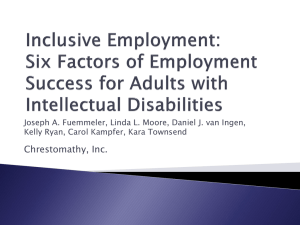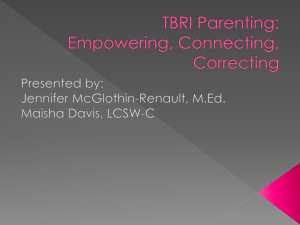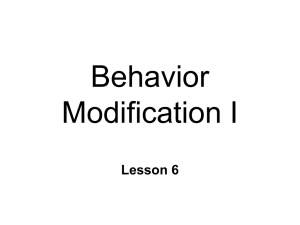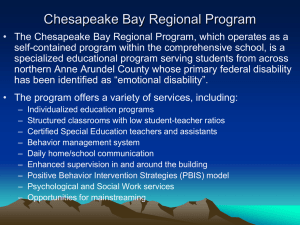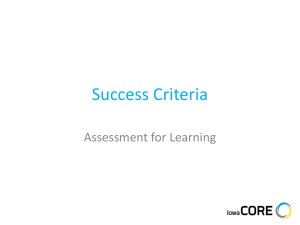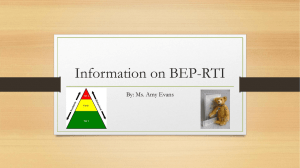PA Behavioral Health Webinar Slides
advertisement
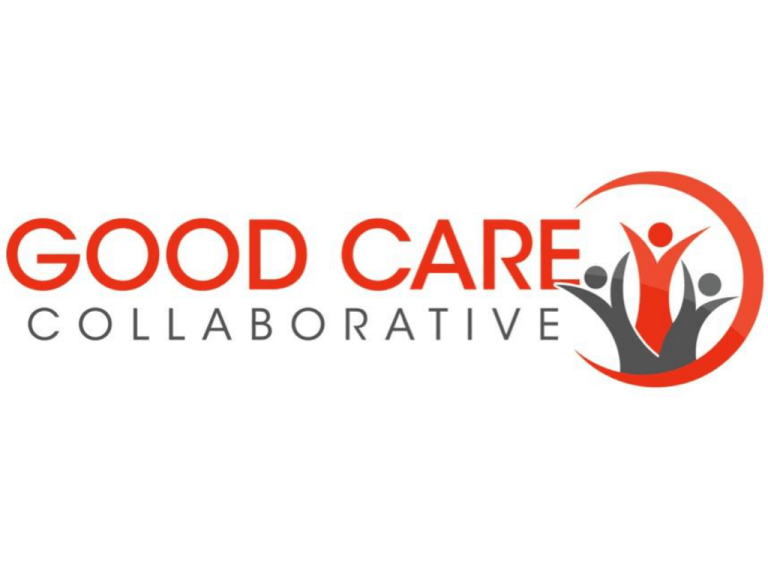
© 2014 Community Care Behavioral Health Organization 1 Achieving Integrated Systems: How a Behavioral Health MCO Partners with Community and Medical Services Featuring: Dr. Jeffrey Brenner Dr. James Schuster Phil Keating Chris Minnich Carmine Picarelli © 2014 Community Care Behavioral Health Organization 2 Good Care Collaborative Steering Committee: • • • • • • • • Dr. Jeffrey Brenner, Camden Coalition of Healthcare Providers Dr. Ruth Perry, Trenton Health Team Michael Anne Kyle, Greater Newark Healthcare Coalition Ev Liebman, AARP NJ Linda Schwimmer, NJ Health Care Quality Institute Jeffrey Brown, Affiliated Accountable Care Organizations Joe Fleming, PICO NJ Ray Castro, New Jersey Policy Perspective © 2014 Community Care Behavioral Health Organization 3 About the Good Care Collaborative: The Good Care Collaborative is a coalition of providers and advocates from across the healthcare spectrum in New Jersey. We are committed to discussing sensible Medicaid reform and defining a collaborative vision of good care. Our goal is to improve the quality of Medicaid services while decreasing costs of the system. In an effort to do so, we will focus on a comprehensive legislative agenda that includes short-, mid- and long-range Medicaid reforms. © 2014 Community Care Behavioral Health Organization 4 Behavioral Health Managed Care and Community Collaborations James Schuster, MD, MBA Phil Keating © 2014 Community Care Behavioral Health Organization Community Care Quick Facts • A nonprofit recovery-oriented behavioral health managed care company • Provider-owned (UPMC) • Incorporated in 1996 and headquartered in Pittsburgh, PA • Federally tax exempt non-profit 501(c)(3) • Major focus is publicly-funded behavioral health care © 2014 Community Care Behavioral Health Organization 6 PA Managed BH Quick Facts • Counties have right of “first opportunity” • Counties have a variety of partnerships with Managed Care Organizations • County direction facilitates close collaborations between MCO and: – County human services – Children and Youth – Forensic Services – State and county BH funding streams © 2014 Community Care Behavioral Health Organization 7 UPMC Operational Structure University of Pittsburgh Medical Center (UPMC) UPMC Insurance Services Division Community Care UPMC Health Plan Askesis Development Group, Inc. Medical Assistance 8 © 2014 Community Care Behavioral Health Organization Membership Trend FY 2004 FY 2005 FY 2006 FY 2007 FY 2008 570,659 562,436 606,663 954,938 1,043,125 FY 2009 FY 2010 FY 2011 FY 2012 FY 2013 1,097,645 1,297,458 1,377,419 1,528,003 1,603,454 © 2014 Community Care Behavioral Health Organization 9 Services in PA and NY Erie Warren McKean Potter Tioga Susquehanna Bradford Wayne Forest Cameron Sullivan Elk Wyoming Lackawanna Lycoming Clinton Jefferson Clarion Clearfield Centre Union Pike Pike Luzerne Columbia Monroe Montour Carbon Hudson River Region Snyder Northumberland Mifflin Allegheny Schuylkill Juniata Blair Berks Huntingdon Adams York Chester Southwest Region Southeast Region North Central Region: County Lehigh-Capital Region North Central Region: County North Central Region: County Northeast Region North Central Region: County North Central Region: State © 2014 Community Care Behavioral Health Organization Community Care Office 10 Focus on Recovery Peer & Family Involvement Recovery Transformation Person with Lived Experience Physical & Behavioral Health Integration Focused Care Management Model © 2014 Community Care Behavioral Health Organization Respecting Individual Differences Systems Integration (Children & Youth) 11 Examples of Recovery-Focused Initiatives • Children’s Accountable Clinical/Health Homes • Adult (SPMI) Accountable Clinical/ Health Homes • Addictions Expansion (Recovery Oriented System of Care) • Physical Health/Behavioral Health Multiple Models © 2014 Community Care Behavioral Health Organization 12 Systems Redesign © 2014 Community Care Behavioral Health Organization Identifying and Coordinating Physical Health Concerns © 2014 Community Care Behavioral Health Organization 14 Two Complementary Approaches • Insurance collaboration supporting member engagement and enhanced provider coordination (Connected Care) • Creation of behavioral health home model in mental health and drug and alcohol settings (Behavioral Health Home Plus) © 2014 Community Care Behavioral Health Organization 15 Connected Care • Initiative to improve the connection and coordination of care for those with Serious Mental Illness among health plans, PCPs, and behavioral health providers in outpatient, inpatient, and ED care settings • Based on Patient Centered Medical Home model with integrated care team and care plan to address all medical, behavioral and social needs • Partnership between: – Center for Health Care Strategies (CHCS) – Department for Public Welfare (DPW) – UPMC for You – Community Care Behavioral Health – Allegheny County Department of Human Services © 2014 Community Care Behavioral Health Organization 16 Reduction in MH Hospitalizations All Members Late Cohort Study Comparison Study Comparison Pre-Intervention Rate per 1,000 Member Mos. 41.1 33.8 25.8 16.2 Intervention Rate per 1,000 Member Mos. 39.6 37.2 43.3 45.1 Difference -1.6 +3.4 +17.6 +29.0 Average Enrollment (months) -4.9 -11.4 Percent Enrolled 18-24 months 0.041 <0.01 Rates for all members dropped 4% in the study group, and increased 10% in the comparison group Rates for the late cohort increased 68% in the study group and increased 179% in the comparison group © 2014 Community Care Behavioral Health Organization 17 Reduction in All-Cause Readmissions All Members Late Cohort Study Comparison Study Comparison 30-Day Readmissions, PreIntervention 43.1 39.5 44.7 39.2 30-Day Readmissions, Intervention Period 38.9 39.7 35.7 40.0 Difference -4.2 +0.2 -9.0 +0.8 Dif. in Differences -4.4 -9.8 <0.01 <0.01 p-Value Readmissions dropped 10% in the study group (all members), and increased 1% in the comparison group Readmissions dropped 20% in the late cohort and increased 2% in the comparison group © 2014 Community Care Behavioral Health Organization 18 Reduction in ED Use Full TwoYear Period By Six-Month Calendar Period July-Dec 2009 Jan-Jun 2009 July-Dec 2010 Jan-Jun 2011 Pre-Intervention Rate, Study 184.4 206.6 190.2 182.5 182.5 Intervention Rate, Study 190.0 250.4 195.3 188.7 169.3 Pre-Intervention, Comparison 167.1 182.4 176.6 171.1 162.3 Intervention, Comparison 195.6 232.6 216.1 184.8 184.9 Dif. in Differences -22.9 -6.3 -34.4 -7.7 -35.8 p-Value 0.052 0.808 0.034 0.583 <0.01 ED visits increased 3% in this study group, and increased 17% in the comparison group © 2014 Community Care Behavioral Health Organization 19 Behavioral Health Home Plus • Services must be: – person/family centered – adhere to recovery principles – promote self-management skills – integrate into the individual’s recovery plan • Individuals do not have to change existing providers or supports, but rather should enhance and build upon the individual’s provider and support network • Integrating Mental health and drug and alcohol care with physical health care creates good health outcomes © 2014 Community Care Behavioral Health Organization 20 Behavioral Health Home Plus • Wellness Coach Training by Peggy Swarbrick for Health Navigators to address Physical Wellness domain and Lifestyle Changes • Health Navigator: Case Manager, Peer Specialist, RN • Self-Management Strategies Used • Focus on ways to integrate and collaborate for best whole person health © 2014 Community Care Behavioral Health Organization 21 Behavioral Health Home Plus • Progress to date: – 4 demonstration sites, including CMSU – 11 additional sites initiated last year with support of federal research funding (PCORI) – 11 additional sites starting later in 2014 © 2014 Community Care Behavioral Health Organization 22 © 2013 Community Care Behavioral Health Organization 23 To learn more about the Good Care Collaborative: Visit our NEW website at www.goodcarecollaborative.org Our next Site Visit will be May 21st, 10:00 am-12:00 pm at Henry J. Austin’s Ryan White Clinic, Trenton, NJ. RSVP to shabnam@camdenhealth.org to reserve your place.
